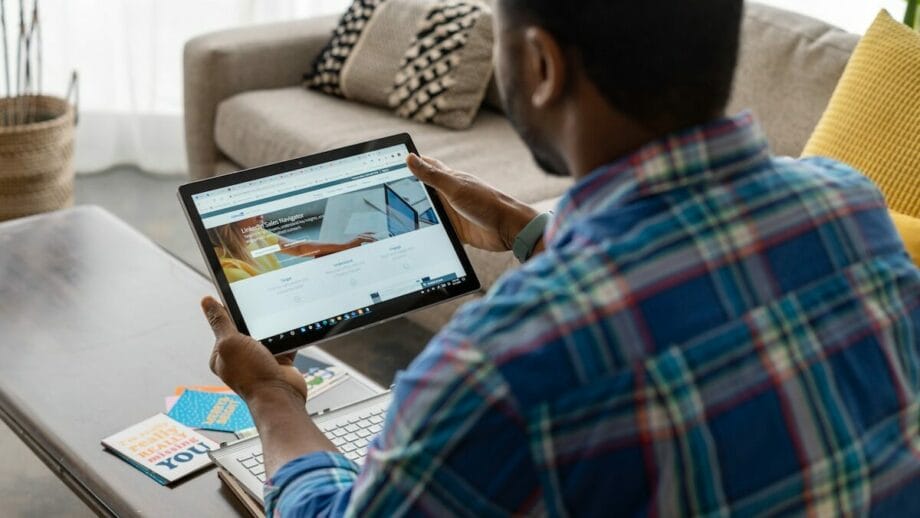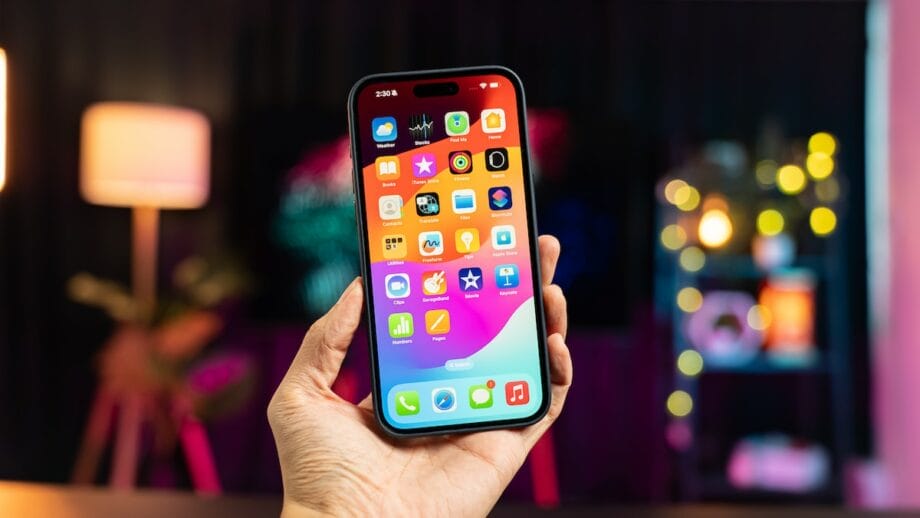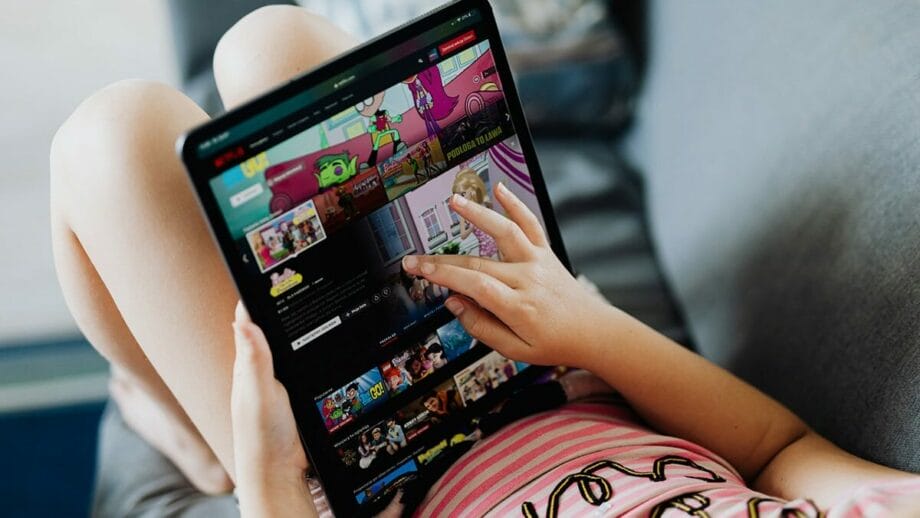Welcome to the digital crossroads, where choosing between a tablet and a smartphone can feel like an epic quest in today’s tech-savvy world. You might find yourself pondering whether to invest in the portability of a smartphone or revel in the expansive view of a tablet for your daily needs.
Here’s one fact that may surprise you: despite their visual differences, tablets are often less expensive than smartphones.
Your confusion ends here – this article is designed to guide you through each gadget’s benefits and drawbacks, allowing you to make an informed decision tailored to your lifestyle.
From multitasking mavens to media junkies, we’ll help identify which device plays into your hands just right. Ready for the reveal? Let’s dive into the details and unwrap the mystery together!
What is a Tablet?
A tablet is a type of mobile device with a touchscreen. It’s bigger than a smartphone but smaller and more portable than a laptop. You can use tablets for browsing the web, watching movies, or taking notes.
They have their own operating system, and you can install apps to do all sorts of things like playing games or checking email. Tablets come with cameras that let you take pictures and talk to friends on video calls.
Plus, they’re not too heavy to carry around! People love tablets because they can do many things without costing as much as smartphones or laptops.
What is a Smartphone?
A smartphone is a mobile phone with so much more power. It lets you talk, text, and connect to the internet. You can also take pictures, use GPS, listen to music, and download all kinds of apps.
Think of it as a pocket-sized computer that can make calls too. Smartphones come in different sizes but usually have smaller screens than tablets. They fit easily in your hand or pocket which makes them great for carrying around all day.
iPhones and Android phones are two popular types of smartphones with many features.
Smartphones keep you connected wherever you go. With Wi-Fi and cellular data, they let you browse the web or check social media anytime! Plus, their batteries last a long time even when doing lots of tasks like gaming or watching videos.
The camera quality on smartphones often rivals actual cameras making them perfect for capturing special moments quickly. And since new models come out often with better technology each time – there’s always something exciting waiting for smartphone users!

Advantages of a Tablet over a Smartphone
While a smartphone fits in your pocket, a tablet opens up a larger canvas for everything from binge-watching to boardroom presentations — let’s dive into the details and discover how this device could revolutionize your digital experience.
1. Larger Screen Size, Easier on the Eyes
A tablet’s larger screen is a big plus. It’s kinder to your eyes when you’re watching videos, playing games, or reading books. You won’t have to squint like you might on a small phone screen. This makes everything clearer and more enjoyable.
If you use your device a lot, the bigger screen also means less eye strain. It’s easier to see details in apps and photos too. Plus, touch controls feel more natural when there’s more room for your fingers to tap and swipe without crowding.
2. Less Expensive
Tablets often cost less than smartphones. This is good news if you’re watching your wallet! They skip the fancy high-end cameras and cellular calling bits that bump up a smartphone’s price. You get to enjoy a lot of what tech offers without breaking the bank.
If you only have a little money and are not looking for a cellular calling option, think about getting a tablet instead of a smartphone. You can browse the web, play games, and watch videos just like on phones but pay way less. It’s smart for saving bucks while still having fun with gadgets!
3. Longer Battery Life
Tablets often outlast smartphones when it comes to how long the battery can go between charges. You get more time to read, play games, and watch videos without worrying about finding a place to plug in. This means you won’t have to charge your tablet as much as you do your phone.
Their batteries are usually twice the size of those in smartphones. Even though tablets have a big screen, they use energy smartly so that you can keep using them for a long time. Having this kind of battery life is great if you’re always on the go and don’t have easy access to a charger.
4. Better for Productivity with Enhanced Multitasking
A tablet’s larger screen and extra space are great for doing lots of things at once. You can see more apps on the screen, so switching between them is a breeze. This makes your work faster and smoother, especially if you’re juggling tasks like checking email, working on a presentation, and chatting with coworkers all at the same time.
Tablets have stronger processors and memory like smartphones but without the extra workload for advanced GPS tracking and cellular network management that eat up a lot of resources in a smartphone. This means they can handle big tasks better without slowing down. Imagine editing a video while downloading files – a tablet can do that kind of work without any trouble. It’s like having the power of a small computer in your hands!
5. Act as a Learning Device, Ideal for Education
Tablets shine in the world of education. They’re light, yet pack plenty of storage for all those learning apps and videos. You can take them anywhere – from home to the classroom without any hassle.
And when lessons go digital, a tablet is your best friend. It opens up a sea of online courses at your fingertips.
With tablets, students don’t just read; they interact. They tap into interactive textbooks and zoom in on graphics to really understand the material. Whether it’s solving math problems or taking virtual field trips, tablets make learning fun and engaging.
Their screens are big enough to share with classmates, too, turning group work into a breeze. Plus, they’re more affordable than laptops but offer similar benefits that help schools give every student a chance to learn with modern tools.

6. Better at Composing Music and Digital Art Designing
A tablet’s big screen and strong processing power make it a great choice for music makers and artists. You can tap, swipe, and draw with ease — just like using real instruments or brushes.
It feels natural to create tunes or art on a tablet because you have more space to work with than on a phone.
Digital art shines when made on tablets. Sharing your masterpiece is simple, plus it looks awesome. Tablets keep all your cool designs safe too. If you love making music or drawing digitally, a tablet could be your new best friend!
7. Better for Video Conferencing
Tablets shine when it comes to video calls. They offer bigger screens, which means you see people better during chats. These large displays help make sure no one gets left out of the group shot.
They also have a flexible edge over phones. You can easily prop up a tablet on a stand or case for hands-free talking. This makes long meetings less tiring since you don’t have to hold anything. Plus, having your hands free means you can take notes or work on other tasks while you talk.
8. Enhanced Reading Experience for Books & News
If you love to read books and catch up on the latest news, a tablet can be your best friend. They have big screens that make it easier for you to enjoy your favorite novels or stay informed with newspaper articles.
Imagine holding lots of books in one light device – that’s what tablets offer. You can carry a whole library wherever you go!
E-books look great on tablets because the screen size helps words and images show up clearly and bright. Plus, taking notes while reading is super simple on a tablet. When you’re using one, it feels almost like reading from an actual book but with the power of technology at your fingertips.
Whether studying or relaxing with a good story, tablets make reading fun and easy without straining your eyes.
9. Great for Gaming
Tablets are pulling ahead in the gaming world. They pack identical power and memory of most smartphones, making games run smoother and look better. Plus, the big screens let you dive into the action without squinting at tiny details. You will find it easier to tap and swipe through your favorite adventures or racing games on a tablet.
For a more classic feel, tablets have you covered too. Hook up an external controller and play like you’re using a console right from your couch! Forget about phone calls interrupting your boss’s fight; with a tablet dedicated to gaming, who’s stopping you from breaking that high score?
10. Better Multimedia Experience for Watching Online Videos
If you love watching online videos, a tablet might just be your best friend. With its big screen, every movie feels like an event and every show pulls you right into the action. You get to see everything clear and bright, making YouTube binges or Netflix marathons truly special.
And let’s not forget those educational clips – with a tablet, learning comes to life as you watch lessons on a display that’s kind to your eyes.
Think about this: A smartphone can tag along in your pocket anywhere you go, but it just doesn’t match up when it’s time for video fun. A tablet gives you room to relax and enjoy yourself without squinting at tiny details or missing out because of a small screen.
It wraps up shows, movies, and clips in one big visual treat that keeps the outside world away while you dive into digital stories and adventures.
Advantages of a Smartphone over a Tablet
You might be surprised to find that despite the space tablets have carved out in our tech-loving hearts, smartphones still pack a punch with unique benefits. Their compact size and advanced features deliver a level of convenience that often makes them the go-to device over bulkier counterparts.
Let’s dive into what gives smartphones their edge — get ready to explore how these pocket-sized powerhouses keep us connected and capable on the go.

1. Portability
Smartphones fit in your pocket and go anywhere with you. They’re easy to hold and use with just one hand. This makes them great for talking, texting, or browsing the web while on the move.
Tablets are also portable but need more space than smartphones. They’re perfect when you want a bigger screen without carrying a big laptop or desktop computer around. Many people carry their tablet in a bag for reading, watching videos, or working during travel.
But with a smartphone, you can quickly pull out from your pocket to check a map, snap a picture, or send a message.
2. Integrated Calling Features
Your smartphone lets you make phone calls anytime, anywhere. It’s made to keep you connected with friends and family. Unlike tablets, your phone can tap into cellular networks. This means even without Wi-Fi, you can chat or send texts.
You always have a way to reach out – during emergencies or just for a quick hello. Smartphones are the go-to call makers that fit snugly in your pocket!
Although many tablets now come with cellular calling facilities, they are not meant to be designed for that purpose. A smartphone is always more convenient and useful for this.
3. Better Connectivity Options
Smartphones take the lead in connecting you with others. They come packed with options to make calls, send texts, and access mobile data on the go. This means you can chat, share, and stay online wherever you are.
Tablets have some of these features too, but smartphones edge ahead because they fit right into your busy life. 5G, Wi-Fi, GPS, Bluetooth, NFC, etc., and the combination of all these options – just work much more efficiently in a smartphone.
Think about how often you use data and talk to friends from different places, how frequently you use the GPS to find a location, or how regularly you use NFC to pay on POS terminals. A smartphone makes it all that easy with its ability to hook up to fast cell networks and Wi-Fi hotspots. You won’t miss a beat when it comes to staying in touch or getting info fast while moving around.
4. Camera Quality
Smartphone cameras are top-notch and pack a punch! Modern smartphone cameras have big enough sensors to suck in lots of light. This means they take clear, crisp photos with less fuzziness or “noise”. Tablets just can’t keep up because their cameras don’t grab as much light. With a smartphone, you get pictures that look amazing even when the sun’s not shining brightly.
Think about those perfect shots you want to share with friends or on social media. Your smartphone is your go-to gadget for snapping them. It’s always with you and ready to capture life’s moments in high-quality glory – from selfies to sunsets! Plus, new tech makes these phone cameras even better over time, giving professional cameras a run for their money.
5. Frequent Updates
Smartphones stay new with fast software updates. They often get these for at least for about three to four years. This means your phone keeps getting better. You’ll have the latest features and security fixes. It’s like getting a fresh phone without buying a new one.
Tablets don’t update as much, especially Android ones. They might only get a couple of updates in their life. With fewer updates, tablets can feel old faster than smartphones do. If you want a device that stays up to date longer, think about this difference.
6. Immediate Accessibility and Ease of One-Handed Use
Your smartphone fits right in your pocket or purse, and you can use it with just one hand. That’s handy when you’re holding a coffee or standing on a bus. Many phones these days have special modes to make the screen smaller so you can reach everything with your thumb.
Think about how often you pull out your phone to check messages, look at maps, or take a quick picture. It is super-fast because smartphones are made to be used on the move with just one hand.
This makes them perfect for busy days when you don’t have time to stop and sit down with a bigger device like a tablet.

7. More Durable
Smartphones can handle a lot. They’re made to survive drops and dings better than tablets. With tough screens and sturdy bodies, they are built for everyday use. Tablets have larger screens (which are great), but this can make them easier to break if you’re not careful.
Think about taking them with you everywhere. A smartphone fits right in your pocket or purse, always ready for action. But because it’s smaller and tougher, it doesn’t get hurt as easily as a tablet might inside a backpack or when left on the couch.
So, while both devices can keep going strong day after day, smartphones edge out ahead in surviving those little accidents we all have sometimes.
8. Advanced GPS with Better Fitness Tracking
Your smartphone is like a fitness coach in your pocket. It uses advanced GPS to track how far you run and where you go. This helps you stay on top of your workouts and reach your health goals.
With a good fitness app, your phone can count steps, map running routes, and keep records of all your exercises.
This makes smartphones super handy for people who love to work out or want to get fit. You don’t need extra gadgets when you have a smartphone that does it all. Plus, with new updates coming in often, the tracking gets better over time.
Whether you’re training for a race or just keeping active, your smartphone’s GPS is there to guide you every step of the way.
9. More Apps Ecosystem
You’ll find that smartphones have a powerful edge – a vast collection of apps. This means whatever you need, there’s likely an app for it on your phone. From organizing your day to finding the best restaurants, smartphone apps cover all bases.
Tablets offer plenty of apps too, but not as many as smartphones do.
Think about pulling out your phone and quickly using a map or fitness tracker. These kinds of handy tools are right at your fingertips with smartphones because developers tend to focus more on creating and updating apps for these devices.
So, if having lots of apps is what you want, a smartphone might be the better choice for you.
10. More Value for Money
A tablet can be cheaper than a smartphone with similar specs. They let you do many of the same things, like browsing the web and watching videos. With a bigger screen, they’re good for reading and games too.
But smartphones are great because they fit in your pocket and keep you connected anywhere. They have better cameras, they get updated more often, they have more powerful GPS, they are more durable, and of course, they are just more versatile in your day-to-day life.
So, although a smartphone is a bit pricier than a tablet with similar features, we must admit that the smartphone is a more “value for money” gadget.
Tablet vs Smartphone: Which One is Better to Whom?
Navigating the choice between a tablet and a smartphone isn’t one-size-fits-all; it hinges on your lifestyle and needs. Let’s dive into who benefits most from each device, ensuring that you pick the right tech companion for your daily adventures.
1. For Students
A tablet is a great choice for students. You can see more on the bigger screen, which helps when you’re in online classes or reading digital books. Tablets are made to be easy to carry and fit lots of information, just like laptops, but they’re even simpler to handle and move around with you.
Tablets make learning easier than smartphones do. You’ll find it feels better to read from them because they give you more space, just like a real book page. Plus, taking notes or doing homework on a tablet is often less tiring for your eyes than trying on a smaller phone screen.
With tablets being so handy and good for school stuff, they can really help students do their best in class and with their homework!
2. For Businesspeople and Working Professionals
If you work a lot, it’s smart to have both a tablet and a smartphone. You can do different things on each device. Tablets are great because they have big screens, which makes them perfect for looking at lots of information at once like reports or presentations. They also let you write and edit documents more easily than on a small phone screen.
Smartphones are important too because you can carry them in your pocket everywhere you go. They make calls and send texts, which helps you stay in touch quickly with your team or clients. Also, they often get new updates faster than tablets do, so they can have the newest tools for your job right away. Having both means doing better work wherever you are!
3. For Gamers
Gamers love tablets for big and bright screens. You see game details easier on a tablet than on a phone. Tablets have strong processors, so games run fast and smoothly. You get to play longer too because tablets usually have bigger batteries.
Get ready for amazing graphics when you use a tablet for gaming. With better visual quality, the action feels real and exciting. Big screens also mean more room to touch and control the game without fingers getting in the way.
So, choose a tablet if you want your gaming to be top-notch!

4. For Content Creators
If you create content, like videos or graphics, a tablet can be your best friend. It has a big screen so you can see more details when you are editing. You won’t have to squint your eyes to find tiny buttons or menu options. With a tablet, it’s also easier to use creative apps and tools because they have space to spread out on the screen.
Tablets are great for drawing with a stylus too. If you draw on photos or make digital art, using a stylus feels natural, just like using a pen on paper. Plus, most tablets have powerful batteries that let you work longer without stopping to recharge. This means you can focus more on making amazing things and worry less about finding an outlet for your charger!
5. For Frequent Travelers
Traveling a lot means you’re always on the move. You need to stay productive, plan your next step, enjoy books or movies, and keep things light. A tablet is perfect for reading on long flights or sketching out ideas with its big screen.
But don’t forget your smartphone! It keeps you connected with calls, texts, and great cameras to capture memories. With both devices in your bag, you can easily switch between work and fun wherever you are.
Your smartphone is quick to grab and use with one hand while rushing through airports or catching a taxi. A tablet gives you more space to work when you sit down in a café or hotel room.
They each have special roles for travelers who want it all – easy planning, staying in touch, enjoying downtime, and not missing out on work tasks. Pack both your tablet and smartphone to handle every part of your trip like a pro!
6. For Media Consumers
If you love to watch YouTube videos or stream shows, a tablet can be a game-changer. With its larger screen, it’s much easier on your eyes compared to a smartphone. Imagine not squinting anymore and instead enjoying your favorite content with all the details nice and clear.
Plus, tablets are built to last longer when you’re watching videos – bye-bye frequent charging breaks!
Tablets kick things up a notch for media consumers who want an awesome experience. They let you do more at once, like checking emails while keeping an eye on a cooking tutorial video.
And because they are easy to carry around, you don’t have to pause that interesting documentary just because you moved from the couch to the kitchen; take your tablet with you! Your video-watching sessions get an upgrade in comfort and fun with a tablet in hand.
7. For Photography Enthusiasts
Smartphones are the go-to choice for photography fans. They come packed with high-quality cameras that take amazing pictures. Plus, they’re easy to carry everywhere. You won’t miss a shot because your camera fits right in your pocket! With better lenses and more power to capture photos, smartphones beat tablets for snapping pics any day.
You might love taking lots of photos on your phone. That’s because smartphones are made to shoot great images even if they’re not as good as big cameras like DSLRs. The handy size makes sure you can capture moments quickly without fumbling around with a larger device like a tablet.
For those who love photography, picking a smartphone is smart.
8. For Videographers and Vloggers
If you make videos or have a vlog, choose a smartphone over a tablet. You can take it anywhere because it’s smaller and lighter. This makes shooting videos easy, even if you’re on the go.
Smartphones often get new camera updates that help your videos look great.
Tablets can be big and unwieldy when trying to catch the perfect shot. But smartphones fit right in your hand. They have cameras designed to record high-quality video quickly and simply.
For anyone creating content for YouTube or social media, having a phone with good video skills is key.
FAQs

Do you have a burning question about whether to choose a tablet or smartphone for your tech needs? Dive into the FAQs where we tackle everything from device capabilities, the need for one versus both, and what sets tablets apart from their pocket-sized companions — answers await to quench your curiosity and guide your decision.
1. What Can a Tablet Do That My Mobile Phone Can’t?
A tablet shines with its large screen. This makes watching movies, playing games, and reading books better. It feels like holding a small TV! With more space, you can see lots of apps at once.
This is great for when you need to do many things at the same time. Also, tablets are kind to your eyes; less squinting means you can use them longer without getting tired.
Tablets can be cheaper than phones but still let you do lots of stuff. They have room for bigger batteries too, so they last longer before needing a charge. If you enjoy drawing or writing on a device, tablets are fantastic – it’s almost like having digital paper! And for schoolwork? Tablets are perfect because they make learning fun with interactive tools that fit right in your hands.
2. What Can a Smartphone Do That My Tablet Can’t?
Your smartphone is a little star that does big things. It fits right in your pocket, so you can take it anywhere easily. You will love how it lets you call anyone at any time. A tablet won’t let you do that! Pictures look stunning on smartphones, and the cameras are top-notch.
They’re built tough and handle drops better than tablets.
Smartphones keep getting new features all the time — more than tablets usually get. If you like to stay up to date, a smartphone is your friend for sure!
And when you need directions or want to track your steps, trust your smartphone to be super accurate with GPS. Plus, there are so many apps! From games to work tools, smartphones have an app for everything.
Remember when phones were just for talking? Now they’re tiny powerhouses ready whenever you need them – whether it’s to send a quick text or check something online with one hand while holding coffee in the other.
Your smartphone makes life simple in ways a tablet just can’t match yet.
3. What is a Phablet?
A phablet is like a big smartphone or a small tablet. It has a screen bigger than what you usually see on phones, but not as big as tablets have. People like phablets because they are easy to carry around and can fit in your back pocket.
You get the best of both worlds – it’s good for watching videos and playing games, just like on a tablet, but you can also make calls with it, like on a phone. They’re great if you want something more than a phone but not too huge. Of course, you should have a larger palm than regular human beings.
4. Do I Need a Tablet If I Already Have a Smartphone?
You might wonder why get a tablet when your smartphone already does so much. Think about this: tablets have bigger screens that make everything from watching movies to playing games more fun. They’re also good for reading books or articles without squinting.
Your phone is great for on-the-go calls and quick internet checks. But if you want to see things larger or need something with longer battery life, a tablet could be handy.
It’s like having the power of a small computer right in your bag, ready for when your phone screen just won’t cut it. Plus, they’re not just big phones — they do some cool stuff phones can’t!
5. Why Tablets are Cheaper Than Smartphones?
Tablets often have a lower price than smartphones. They use less complex tech and more straightforward designs. This means they cost less to make. A tablet’s big size also helps cut costs. It lets companies use cheaper materials and easier building methods.
Smartphones, on the other hand, pack many features into small bodies. They need special parts that are costly to create and put together. Plus, phones must have strong signals for calls and data everywhere you go. So, they require extra tech that adds to their price.
6. What Are the Differences Between a Tablet and an iPad?
An iPad is a type of tablet made by Apple with its own iOS. Most other tablets run on Google’s Android. This means iPads often work smoother and may feel easier to use. They also have a strong build quality which can make them more stable devices.
But for those looking at cost, Android tablets usually cost less than iPads.
A big difference lies in how each device handles apps and videos online. While iPads are locked into Apple’s App Store, Android tablets can download apps from many places on the web. If you love watching videos or need certain apps not found on the App Store, an Android tablet might be the way to go.
On the flip side, if you want something that feels premium and gets regular updates from Apple, pick an iPad.
7. Should I Buy a Tablet with Call Facility?
Buying a tablet with call capability might seem like a good pick. It lets you make calls and do all the tablet things on one device. But hold on! Think about how often you’ll use it to talk.
Tablets are bigger and not as easy to carry as smartphones when making calls. Sure, some tablets can act like phones, but they’re just not as handy for calling people.
If phone calls are important to you, getting a smartphone is usually best. They fit right in your pocket and are built for talking on the go. Plus, a smartphone is easier to hold next to your ear for long chats.
So, if quick calls and comfort matter most, stick with a smartphone and enjoy both worlds by having separate devices for different needs.
8. Is a Tablet Worth Buying?
A tablet can be a smart choice if you want a bigger screen for watching videos, playing games, or drawing. They are often cheaper than smartphones but still let you do many of the same things as browsing the web and using many apps and games.
Tablets have longer battery life too, so they can be great for reading books or doing schoolwork without needing a charge all the time.
If you already own a smartphone, think about what you’d use a tablet for. It could be worth getting one if it makes certain tasks easier or more enjoyable for you. And since tablets are less expensive, buying one won’t hurt your wallet as much as getting a new phone might.
9. Is a Smartphone Worth Buying?
You bet a smartphone is worth buying. It’s like having a powerful computer right in your pocket! You can make calls, send texts, and even snap amazing photos with it. Smartphones keep you connected to friends, help you find places with GPS, and let you enjoy all sorts of games and apps.
Owning a smartphone also means always having the internet handy for quick searches or checking emails on the go. And that’s not all – regular updates make sure your device stays fresh with new features.
Think about how much use you get from your phone every day; the value is clear! From morning alarms to fitness tracking – this little gadget does it all.
10. What are Some Popular Tablets to Buy Now?
Looking for a new tablet? Lots of great choices are out there. The Samsung Galaxy Tab S8 is excited by experts, with its bright screen and long battery life. It’s an Android tablet that shines for both work and play.
On the Apple side, the iPad Pro is making waves with its powerful chip and stunning display; it’s perfect for digital artists or anyone who wants a smooth experience.
For those who like to keep costs down, check out the Amazon Fire HD 10. It won’t break the bank but still lets you stream movies, browse the web, and more. Remember these tablets have been tested by professionals to make sure they’re top-notch for what you need!
11. What are Some Popular Smartphones to Buy Now?
You might like the latest smartphones from Apple, Samsung, and Google this year. The new iPhone 15 Pro Max is packed with cool features and takes great photos. Samsung Galaxy S23 Ultra has big clear screens and can last a long time on one charge.
Google Pixel 8 Pro is smart too – it helps you with your day and take amazing pictures even when it’s dark.
Each brand has different models to choose from depending on what you need and how much you want to spend. These smartphones do more than just make calls; they keep your life organized. They let you play games, watch videos, and stay connected with friends online. With these devices in your pocket, you can do almost anything no matter where you are!
Conclusion

Alright, let’s wrap this up. Tablets are cool for their big screens and long battery life. They’re great for school stuff, digital drawing, and enjoyable videos. Smartphones, on the other hand, fit right in your pocket and keep you connected with calls and texts. They also take awesome pictures.
Think about what you need most. Maybe a tablet is perfect for playing games or reading e-books at home. Or perhaps a smartphone’s GPS keeps you on track during your daily run.
Both gadgets have their own superpowers — it depends on what works for you! Remember this: choose what helps you do your things better and makes sense for your wallet too. Whether it’s a tablet or smartphone — or both — go ahead and pick the one that fits into your life just right!





